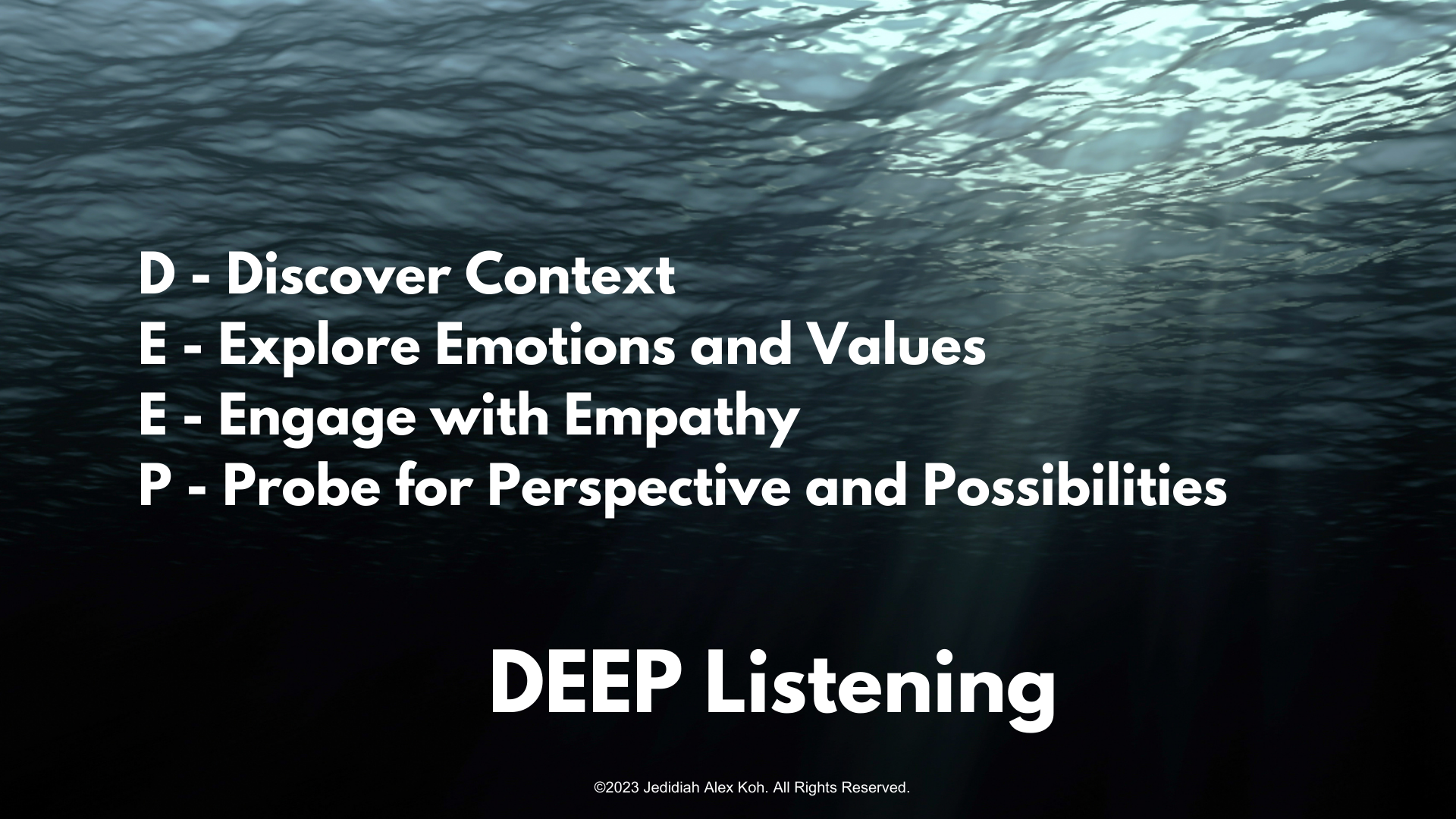DEEP Listening - The Coaching Inquiry Framework to Enhance Coaching Conversations
“Deep inquiry is not just about asking questions; it’s about unlocking the doors of perception and understanding.”
Introduction
In the dynamic field of coaching, the ability to ask powerful, transformative questions is paramount. It's not just about what you ask, but how and when you ask it. This is where the DEEP Inquiry Framework comes into play, a revolutionary approach designed to take your coaching conversations to new depths. Whether you're a seasoned coach or just starting, the DEEP Inquiry Framework provides a structured yet flexible method to understand your clients on a profound level and facilitate their journey towards self-discovery and growth.
1. Discover Context
Every effective coaching session begins with a solid understanding of the client's background and current context. This phase is about laying the groundwork for a meaningful dialogue.
Client Background Research. Prior to your session, gather essential information about your client’s professional and personal background. This initial step helps in customizing your approach.
Context Setting Questions. Start your sessions with open-ended questions. These questions aim to clarify the client's current situation, challenges, and objectives, setting the tone for the conversation.
2. Explore Emotions and Values
Once the context is established, it's time to delve deeper into the client's emotional landscape and core values. This phase is crucial for creating an empathetic connection.
Emotion Mapping. Encourage your clients to express their feelings about their situation. Questions like, "What emotions does this situation bring up for you?" can be insightful.
Values Identification. Understanding what your client values most brings clarity and direction to the coaching process. Inquire about their guiding principles with questions like, "What values are you leaning on in this situation?"
3. Engage with Empathy
This stage is about building a stronger rapport by demonstrating empathy and understanding. It's where active listening is key.
Reflective Listening. Show your clients that you're not just hearing them, but truly understanding their perspective. Reflect back their emotions and values to validate their experience.
Empathy-Based Questioning. Frame your questions in a way that shows you recognize and appreciate their emotional state. For instance, "Given how significant this is for you, what support would be most helpful?"
4. Probe for Perspective and Possibilities
The final phase is about opening new avenues for the client to explore. Here, the focus shifts to broader perspectives and future possibilities.
Perspective Shifting Questions. Challenge your clients to view their situation from different angles, asking questions like, "How might a person with a completely opposite view perceive this?"
Possibility Exploration. Encourage clients to think beyond current constraints. Ask, "If you were free of all limitations, what would you like to achieve?"
Implementation in Coaching Sessions
Implementing the DEEP Inquiry Framework isn’t a linear process. It’s flexible and can be adapted to each unique coaching session. The key is to seamlessly transition between phases, keeping the client's needs and responses in mind.
Advanced Exercises for Coaches
To master the DEEP Inquiry Framework, practice is crucial. Engage in role-playing exercises, keep a reflective journal, and seek feedback from peers or mentors. Each interaction offers an opportunity to refine your skills.
Integrating DEEP Inquiry with ICF Core Competency 6: Tailoring Questions to the Client’s Unique Context
A crucial aspect of the DEEP Inquiry Framework is its alignment with the ICF's Core Competency 6, especially the PCC marker 6.1, which emphasizes the customization of a coach’s questions and observations based on their understanding of the client’s identity and situation.
Personalized Approach in Discover & Explore Phases. In the Discover and Explore phases of DEEP, coaches gather detailed information about the client’s background, emotions, and values. This process directly supports CC6, particularly marker 6.1, as it enables coaches to tailor their questions and observations to the specific context and identity of the client. By delving deeply into the client’s personal narrative, coaches are better equipped to formulate questions that resonate on a personal level, enhancing the relevance and impact of the coaching conversation.
Enhancing Coach’s Effectiveness. This personalized approach is fundamental in effective coaching. It ensures that the coaching session is not just a generic dialogue but a targeted exploration tailored to the client's unique journey. This not only deepens the client’s self-awareness but also fosters a stronger coach-client relationship, a cornerstone of successful coaching outcomes.
Practical Application in Our Classes. In our training sessions, we focus on developing the skill of customizing questions and observations as per marker 6.1. Through practical exercises, coaches learn to interpret the nuances of their client's communication, aligning their inquiries and feedback with the client's distinct needs and objectives. This not only meets the standards set by the ICF but also elevates the coach's ability to facilitate meaningful change.
By integrating the DEEP Inquiry Framework into your coaching practice, you align with the core principles of ICF Competency 6, specifically marker 6.1, ensuring your coaching is as impactful and client-centered as possible. Join our classes (Co-Creative Coaching) to explore this framework in depth and learn how to craft personalized, effective coaching conversations that resonate with and empower your clients.
The DEEP Inquiry Framework is more than just a tool; it's a pathway to deeper, more impactful coaching conversations. It guides coaches to not only understand their clients better but also to empower them to unlock their full potential. In adopting this framework, you'll be equipped to facilitate transformative growth in your clients and stand out in the coaching field.
“Each client is a unique story waiting to be deeply understood. As coaches, we are the scribes of unseen chapters, helping to reveal their narrative.”
